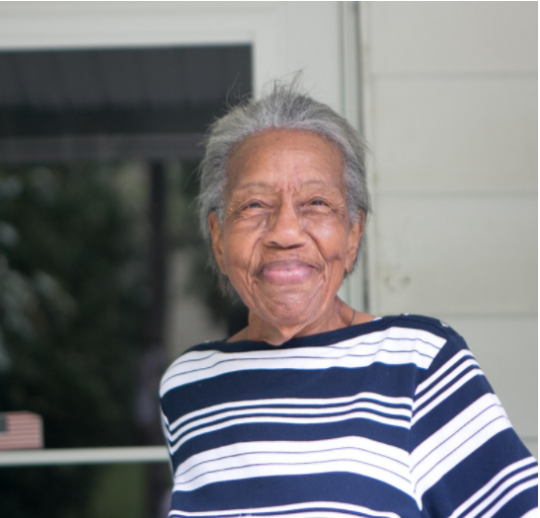A Recollection of Miss Willie Mae Patterson, 1926-2017
I received the news that Miss Willie Mae Patterson had passed while on a train home from New York. Oh noooo, I said loudly enough to disturb the passenger to my left. Too soon. She has left us too soon. I remembered so vividly our birthday visit to Miss Willie Mae’s home just a few weeks earlier. The entire MCJC staff filled the living room where family were gathering to celebrate. We sang the “old songs” Willie Mae requested—“old” as in: “Blessed Assurance” AND “My Girl.” We were a bit giddy with the helium-balloon pleasure of it all. Miss Willie Mae held us captivated by her glowing delight. She was clearly in pain. She had trouble saying what she meant. But, for a few long moments, those troubles fell away to the power of singing and humming along and just clapping joyfully to lift us all, together, again and again.
I jolted back to the rumble of the train on the rails only to spin off into remembering another afternoon there at Miss Willie Mae’s. This time the MCJC staff had joined with Orange Habitat volunteers to paint and repair the white walls of Willie Mae’s house and to clear out her front garden. As usual, I found myself in an obsessive wrangle with weeds. At the end of the day, I had to be pulled away as hard as I was pulling on the weedy suckers that wound down around and into the foundation: they just wouldn’t surrender. One more minute, I kept protesting, when called for a drink of water or to close up shop. Finally, wearing my welts with pride, I settled into a seat on the porch with Miss Willie Mae while she shook her head in awe at the sight before her: the bird bath and pathway and rock wall that lined the front of her property freed from years of overgrowth, the spring day rising with all its promise from the freshly turned ground and the pink faces of the impatiens a volunteer just had to go get and plant. We sat on opposite sides of the door frame. I tried to see what she saw (which seemed to include many previous spring days and many yet to come) but was distracted by seeing her: I was entranced.
Over the years, she had grown thin. The skin drew tight around her high cheek bones, making her beloved smile that much more prominent. She was still working as a crossing guard over at Carrboro Elementary and had returned from her duties late in our afternoon’s efforts. She took her seat with the relief of years sitting in the same spot, watching out over the garden, the cars and children passing by, the neighborhood at work. From our perch we could now see the full length of Northside’s famous rock wall. Cleared of creeping ivy, the wall was as new and as old as it had been when it was first built. Miss Willie Mae revelled in telling me about how her mother had directed her and her siblings to gather up rocks left-over from a construction project across the way. While she spoke, I flashed onto Miss Fannie standing on that same front porch instructing a gaggle of kids to haul over the rocks and then, using the same skills generations of Northsiders had brought to the walls surrounding UNC, laying one on top of another in a puzzle of compact perfection. The wall soon became the resting spot for everyone working their way up McDade on their way to school or on their way home from work (the hill has since been levelled). You could just sit and figure out a problem. Or you could plot and gossip—and, in late February 1960, plan the first sit-ins in Chapel Hill. But if any one group tried to monopolize the prized gathering place, Miss Fannie would have none of it: “this wall is for EVERYBODY!” she’d famously shout out, breaking up the cliques and reasserting a code of neighborly inclusion as solid and sure as the wall itself.
In the midst of my reverie, the train had come to a halt. Outside, seven/eight police officers surrounded a man standing rigid, his back pressed up against the train’s shell. More police arrived, each one stepping nattily across the chain that barred pedestrian access. One pawed through each item in the man’s bag. Another paced, a phone pressed close to his ear. One suddenly appeared in the aisle, clutching a computer cord, asking the woman across from me what had happened. She explains that she’d seen “some big words” come up on the man’s computer screen and then he typed something really fast and then slammed the computer shut. That seems sufficient; the officer leaves. I look out the once pastoral window again. Of course, I realize: the man is dark-hued. Olive-skinned. Mediterranean or Middle-Eastern. What does it matter: whatever the woman found suspicious had now made him a suspect, subject to all of those rites we reserve for people found guilty before proven innocent.
I got up. Went to the café car, hoping to find some breathing room or at least a little bit of disbelief to keep me company. Instead, I ran into rounds of well-worn phrases–“well, I guess it’s better to be safe than sorry” and “you just never know”–passed back and forth among the passengers and train staff like a bag of candy. I kept trying to say “it could have been any of us” but the words seemed to dissolve into sun dust before they could become sound. Was I even speaking? The air was thick; the easy arrogance was thicker. I returned to my seat, wondering what part I had or hadn’t played in this drama of quick isolation and exile.
A train pulls into the station, heading in the opposite direction. The man is escorted on. The conductor tells us that as soon as it pulls out of the station, we will be free to go. With a bump and roll, our train continues southbound and the din of complaints about the hour’s delay fall away to the thrum of “normal” banter. I turn back to Miss Willie Mae. I hear again the few words she spoke when we rested there, on her mama’s porch. I luxuriate in memory of the quiet we shared, while she admired her garden and I admired her. And for a moment I hear more clearly than the conductor’s booming voice announcing the next stop, Miss Fannie insisting “this wall is for EVERYBODY”– and the tears of gratitude for Miss Willie Mae’s life and the ancestry she carried finally flow. We need you now more than ever, Miss Willie Mae. We need the bedrock of your history. We need the vision you held dear. We need your fierce service. We need to rise to the example of pride and joy you set. We need to be the garden of your memories, nurturing constant inclusion, weeding out the poisonous distrust, suspicion, and taking-care-of-MYself that seem to have overgrown just plain good sense, much less care and wonder. We need to share the wall. Move OVER somebody. Make room. Miss Willie Mae and Miss Fannie are watching out.

For a glimpse of Miss Willie Mae’s expansive spirit, check out this video made in collaboration with the Community Empowerment Fund for the “Penny for Affordable Housing” campaign; listen up just before minute 7: https://vimeo.com/95736718.
Della Pollock
June 27, 2016

Leave a Reply